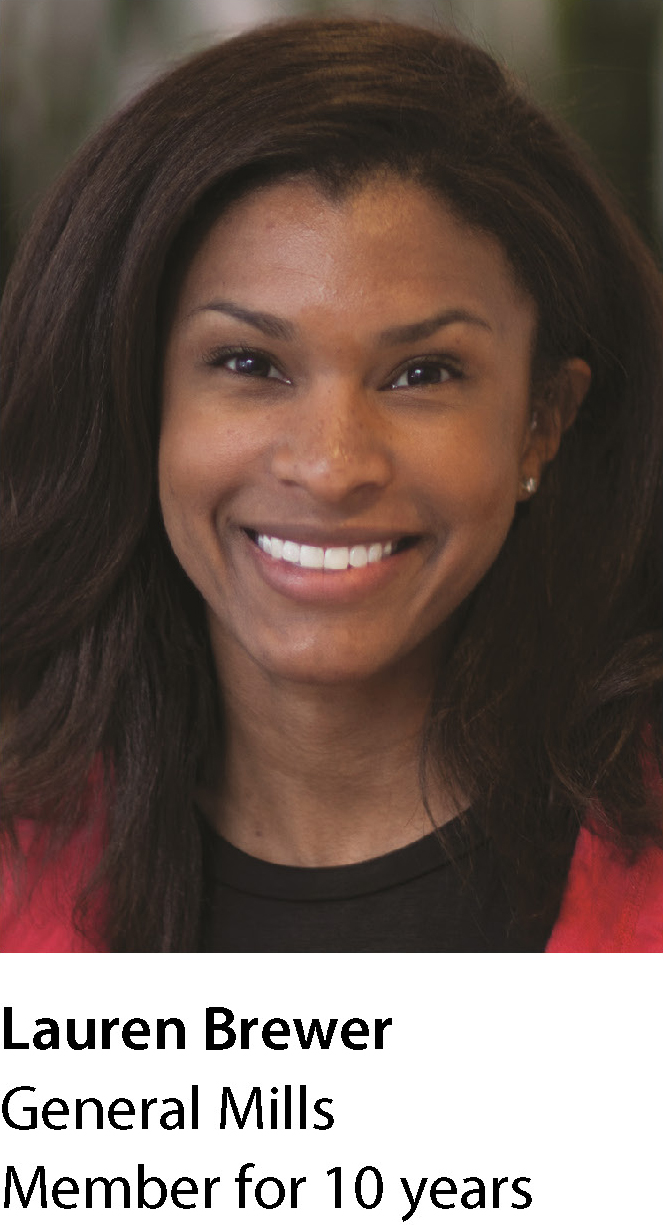 Q: What is your current position and what type of work do you do?
Q: What is your current position and what type of work do you do?
A: I am a senior professional for General Mills in the Innovation Technology and Quality team. I work with my cross-functional partners to build products that the consumer really loves. Being in R&D, I develop products from idea to consumption, making sure that they are designed as safe, high quality offerings for one of our many brands.
Q: When and how did you first decide you wanted to work in cereal grain science?
A: I went into undergraduate school as a food science major and loved it. During my first internship, I saw that everyone who had a job I wanted had a graduate degree. Therefore, I knew I wanted to continue my education. This may age me, but I chose cereal grain science because grain was at the base of the food pyramid—it was the foundation, and I knew I wanted my expertise to be in the foundation of the global diet.
Q: When did you first join AACCI and why?
A: During my first AACCI Annual Meeting, I was a graduate student and invited to a CPG company-sponsored, “high-tech” symposium to speak on near-infrared spectroscopy. I thought for this organization to trust and invite me to this meeting, as well as to have people in my presentation room listening and learning and asking questions after a 40 minute presentation on confocal microscopy, this is a worthwhile group. I joined the organization the following year.
Q: Why did you decide to volunteer with AACCI? How did you get involved, and what has been rewarding about this experience?
A: There is an old Danish saying, “If you decide to do anything, do it well, because the hassle is the same.” I was still a student at the time and wanted to help with any divisions or sections that really needed someone to help drive change, so I volunteered to be the Young Cereal Chemist Conference chair—later learning that the North American students had never held their own conference before, but the EU students were on year 10 (at the time). But, I did it. I think we had approximately 40 students at the conference, including one who came from a university in Mexico. The people who I met during that experience, as well as the many other experiences I have had with AACCI, have been worth all the time invested.
Q: Are you a member of any AACCI Divisions? If so, which ones, and how has your work with the divisions helped your career?
A: There are a lot of AACCI Divisions that I have been a part of in my 10 years in the organization, including the Milling and Baking, Nutrition, and Carbohydrate Divisions. Whenever I am in a division or section meeting, I try to be an active member. Right now, I am an active member of the Northwest Section. Currently, we are trying to find the balance between hosting enough events to stay relevant and respecting our members’ work/life balance. Sometimes we do this by partnering with other (competitive, some would say) organizations. I think this gives us an advantage. We can do more, cover more ground, and think differently. My involvement with the Northwest Section has conditioned me to do all those adaptive things in my career as well.
Q: What do you see as important issues that are shaping the field of milling and baking? How are these issues affecting cereal science and the cereal grain industry overall?
A: Whew, big question. There is game-changing legislation under way right now on flour as “ready to eat.” What does that mean for farmers who are dealing with climate change and organic certifications regulations? Or, millers who have tight margins and variable income streams? Where does sullying lie in relation to utilizing crops when there are 7.5+ billion people who need to be fed? Overall, the impact of this issue is felt from field to fork. Generals Mills is historically a leader in food safety (i.e., HACCP was a collaborative effort among Pillsbury, NASA, and the U.S. Army Laboratories), and we are making remarkable strides in continuing to be that food safety industry leader.
Q: This issue of CFW focuses on the artisan baking trend. Do you have any perspectives on the opportunities and challenges within the artisan baking movement?
A: I would say one challenge is the standard of identity. There are few places that I go to in Minneapolis to get a good baguette. Artisan is trendy, but those who can deliver on that experience are in the season of opportunity. It is sustenance as well as an emotional sensory experience that you are paying for when you purchase artisan bread. In my mind, a good piece of bread takes me back to Lyon, France, that’s why I believe that the product is worth the premium.
Q: What’s next for you?
A: I plan to serve the world by making food people love; I plan to leave the world better than I found it; and I plan to send the elevator of success back down—the way it was held for me.
